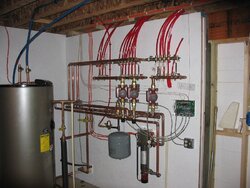How do you guys feel about using an electric boiler as backup heat? I'm planning on having enough storage to give me 24 hours of heat and I hardly ever am gone more than just during the day - but its nice having a backup in case something happens with the wood burner, or for some reason we are gone a day or two. Right now I have an oil furnace, so to start with I will use that as my backup heat source. But it is almost 30 years old, and when it dies I don't really want to buy another one. If I went with an electric boiler I could get rid of the oil tank and seal up my chimney vent. Only thing is that if I was gone for long it could get pricey. It would cost me $75/day if it's 0 degrees out, $20/day when it's 45 or so outside. Theoretically, the electric would never run unless it was an emergency. So the price seems reasonable. Also as an added bonus, there is zero chance of carbon monoxide building up in the house (wood heat is outside).
What do you guys think?
What do you guys think?


